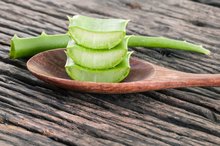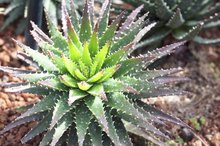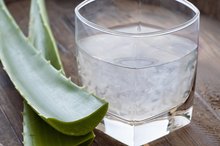What does fact checked mean?
At Healthfully, we strive to deliver objective content that is accurate and up-to-date. Our team periodically reviews articles in order to ensure content quality. The sources cited below consist of evidence from peer-reviewed journals, prominent medical organizations, academic associations, and government data.
- National Institutes of Health: Aloe
- “Indian Journal of Experimental Biology”; Effect of Aloe Vera (L.) Burm. Fil. Leaf Gel and Pulp Extracts on Kidney in Type-II Diabetic Rat Models; S Bolkent, et al.; Jan 2004
- “Indian Journal of Experimental Biology”; Effect of Aloe Vera (L.) Burm. Fil. Leaf Gel and Pulp Extracts on Kidney in Type-II Diabetic Rat Models; S Bolkent, et al.; Jan 2004
- “American Journal of Kidney Diseases”; Herbal Remedy-Associated Acute Renal Failure Secondary to Cape Aloes; VA Luyckx, et al.; Mar 2002
- “American Journal of Kidney Diseases”; Herbal Remedy-Associated Acute Renal Failure Secondary to Cape Aloes; VA Luyckx, et al.; Mar 2002
The information contained on this site is for informational purposes only, and should not be used as a substitute for the advice of a professional health care provider. Please check with the appropriate physician regarding health questions and concerns. Although we strive to deliver accurate and up-to-date information, no guarantee to that effect is made.
Aloe Vera & Kidney Disease
Although aloe has been used since ancient Egyptian times to treat skin problems and constipation, the U.S. Food and Drug Administration has removed laxatives containing aloe from the market due to safety concerns. Aloe may interact with some medicines you are taking and may worsen certain conditions that you may have, such as kidney disease, says the National Institutes of Health or NIH. As with any supplement, consult with your doctor before taking aloe medicinally.
How It Works
The aloe plant produces two compounds. Aloe latex is a bitter yellow juice that is formed just below the leaf’s skin, and the clear aloe gel is found in the inner part of the leaf. Aloe juice contains chemicals called anthraquinone glycosides that are strong laxatives. The active substances in the gel are glycoproteins and polysaccharides, which act to block pain and inflammation, repair tissue, and boost the immune system.
- The aloe plant produces two compounds.
- Aloe juice contains chemicals called anthraquinone glycosides that are strong laxatives.
Beneficial Effects
Can You Drink Aloe Vera Juice When Taking Coumadin?
Learn More
Preliminary evidence suggests that aloe gel may have beneficial effects in certain types of kidney disease. A study published in the "Indian Journal of Experimental Biology" in 2004 showed that diabetic laboratory animals with diabetes-induced kidney disease who received aloe gel had improvement in their kidney disease as compared to a control group of animals that did not receive aloe 3. The authors suggested that aloe gel may have protective effects against kidney damage produced by type 2 diabetes.
Toxic Effects
According to the NIH, aloe juice can cause potentially serious kidney injury and possibly death. In fact, in 2002 the "American Journal of Kidney Diseases" published a case report of a man who was hospitalized with kidney failure after taking aloe juice 4. After several weeks of kidney dialysis, this person slowly regained his kidney function. The NIH warns that, if you have kidney disease, you should avoid aloe juice because it can make your condition worse.
- According to the NIH, aloe juice can cause potentially serious kidney injury and possibly death.
- The NIH warns that, if you have kidney disease, you should avoid aloe juice because it can make your condition worse.
Other Considerations
Health Risks & Benefits of Taking Aloe Vera Juice Internally
Learn More
If you take aloe juice, you may experience some side effects, such as stomach pain and cramping, says the NIH. When taken in large doses for an extended time, aloe juice may cause:
- other serious problems
- including heart disorders
- muscle weakness
- diarrhea,
- weight loss
Avoid aloe juice during pregnancy or breast-feeding.
Related Articles
References
- Drugs.com: Aloe
- PaloAltoMedicalFoundation.org: Aloe
- “Indian Journal of Experimental Biology”; Effect of Aloe Vera (L.) Burm. Fil. Leaf Gel and Pulp Extracts on Kidney in Type-II Diabetic Rat Models; S Bolkent, et al.; Jan 2004
- “American Journal of Kidney Diseases”; Herbal Remedy-Associated Acute Renal Failure Secondary to Cape Aloes; VA Luyckx, et al.; Mar 2002
- Nejatzadeh-barandozi F. Antibacterial activities and antioxidant capacity of Aloe vera. Org Med Chem Lett. 2013;3(1):5. doi:10.1186/2191-2858-3-5
- Wan P, Chen H, Guo Y, Bai A-P. Advances in treatment of ulcerative colitis with herbs: From bench to bedside. World Journal of Gastroenterology : WJG. 2014;20:14099-14104. doi:10.3748/wjg.v20.i39.14099
- Guo X, Mei N. Aloe Vera: A Review of Toxicity and Adverse Clinical Effects. J Environ Sci Health C Environ Carcinog Ecotoxicol Rev. 2016;34(2):77-96. doi:10.1080/10590501.2016.1166826
- Guo X, Mei N. Aloe vera: A review of toxicity and adverse clinical effects. J Environ Sci Health C Environ Carcinog Ecotoxicol Rev. 2016;34(2):77-96. doi:10.1080/10590501.2016.1166826
- Langmead L, Feakins RM, Goldthorpe S, et al. Randomized, double-blind, placebo-controlled trial of oral aloe vera gel for active ulcerative colitis. Aliment Pharmacol Ther. 2004;19(7):739-47. doi:10.1111/j.1365-2036.2004.01902.x
- National Center for Complimentary and Alternative Medicine. Aloe Vera. Herbs at a Glance. Dec 2006.
Resources
Writer Bio
Diana Kaniecki has been writing health-related articles since 1991. Her work has appeared in peer-reviewed health journals including the "American Journal of Cardiology," "Chest" and "Pharmacoeconomics." She also develops health technology products for wellness and chronic illness self-management. Kaniecki received her Doctor of Clinical Pharmacy from St. Johns University.









